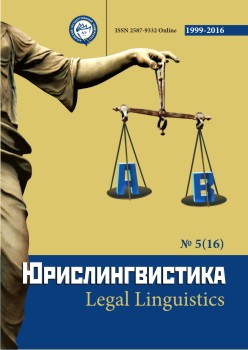ESTABLISHMENT OF THE SUBJECT SITUATION OF A CONVERSATION UPON CONDITION OF ELIMINATION OF THE TOPIC OF SPEECH (IN THE CONTEXT OF FORENSIC EXPERTISE)
Abstract
Basing on expert case studies the article demonstrates the expert approach to establishing / revealing the features of the subject situation of motivation upon condition of elimination of the topic of speech within the framework of the forensic linguistic expertise in drug and other patent substance trafficking proceedings.
Downloads
Metrics
References
Борисова И.Н. Русский разговорный диалог: Структура и динамика. Москва, 2009.
Васильева Е.А. К вопросу о предметной ситуации в переводе. Подходы к описанию предметной ситуации. Вестник Московского государственного университета № 9 (642), 2012. URL: https://ciberleninka.ru/article/n/k-voprosu-o-predmetnoy-situatsii-v-perevode-podhody-k-opisaniyu-predmetnnoy-situatsii.
Доронина С.В. «Командир! Может, договоримся?»: приемы дискурсивного анализа в лингвистической экспертизе текстов по антикоррупционным делам. Политическая лингвистика № 3 (53), Екатеринбург, 2015. – С. 245-249.
А. Н. Баранов, О. М. Грунченко, М. В. Кроз, Н. А. Ратинова. Классификация коммуникативных интенций, выявленных в ходе лингвистических и психолого-лингвистических исследований текстов. Москва, 2013.
Комиссаров В.Н. Теория перевода (лингвистические аспекты). Москва, 1990.
Разговорная речь в системе функциональных стилей современного русского литературного языка: Грамматика/ под ред. О.Б. Сиротининой. Москва, 2009
REFERENCES
Borisova I.N. Russian spoken dialogue: Structure and dynamics [Russkii razgovornii dialog: struktura i dinamika]. Moscow, 2009
Vasil'eva E. A. To the problem of the subject of the situation in translation. Approaches to the description of the subject of the situation [K voprosy o predmetnoi situasii v perevode. Podhody k opisaniu predmetnoi situasii]. Bulletin of Moscow state University No. 9 (642), Moscow, 2012. URL: https://ciberleninka.ru/article/n/k-voprosu-o-predmetnoy-situatsii-v-perevode-podhody-k-opisaniyu-predmetnnoy-situatsii.
Doronina S. V. «Let`s agree, commander! »: the methods of discourse analysis in forensic expertise in anticorruption proceedings [Komandir! Moget, dogovorimsya?»: priemi diskursivnogo analisa v lingvisticheskoi ekspertize po antikorruptsionnim delam]. Political linguistics No. 3 (53). Ekaterinburg, 2015. – P. 245-249.
Baranov A. N., Grunchenko O. M., Kroz M. V., Ratinova N. A. The classification of communicative intentions identified in the linguistic and psycho-linguistic studies of texts [Klassifikatsiya kommynikativnih intentsii, viyavlennih v hode lingvisticheskih i psihologo-lingvisticheskih issledovaniy tekstov]. Moscow, 2013.
Komissarov V. N. Theory of translation (linguistic aspects) [Teoriya perevoda (lingvisticheskie aspekti)]. Moscow,1990.
Colloquial speech in the system of functional styles of modern Russian literary language: Grammar, ed. by O. B. Sirotinina [Razgovornaya rech v sisteme funktsionalnih stiley sovremennogo russkogo literatyrnogo yazika: Grammatika]. Moscow, 2009.
Copyright (c) 2017 Юрислингвистика

This work is licensed under a Creative Commons Attribution 4.0 International License.
The authors, which are published in this journal, agree to the following conditions:
1. Authors retain the copyright to the work and transfer to the journal the right of the first publication along with the work, at the same time licensing it under the terms of the Creative Commons Attribution License, which allows others to distribute this work with the obligatory indication of the authorship of this work and a link to the original publication in this journal .
2. The authors retain the right to enter into separate, additional contractual agreements for the non-exclusive distribution of the version of the work published by this journal (for example, to place it in the university depository or to publish it in a book), with reference to the original publication in this journal.
3. Authors are allowed to post their work on the Internet (for example, in a university repository or on their personal website) before and during the review process of this journal, as this may lead to a productive discussion, as well as more links to this published work (See The Effect of Open Access).











